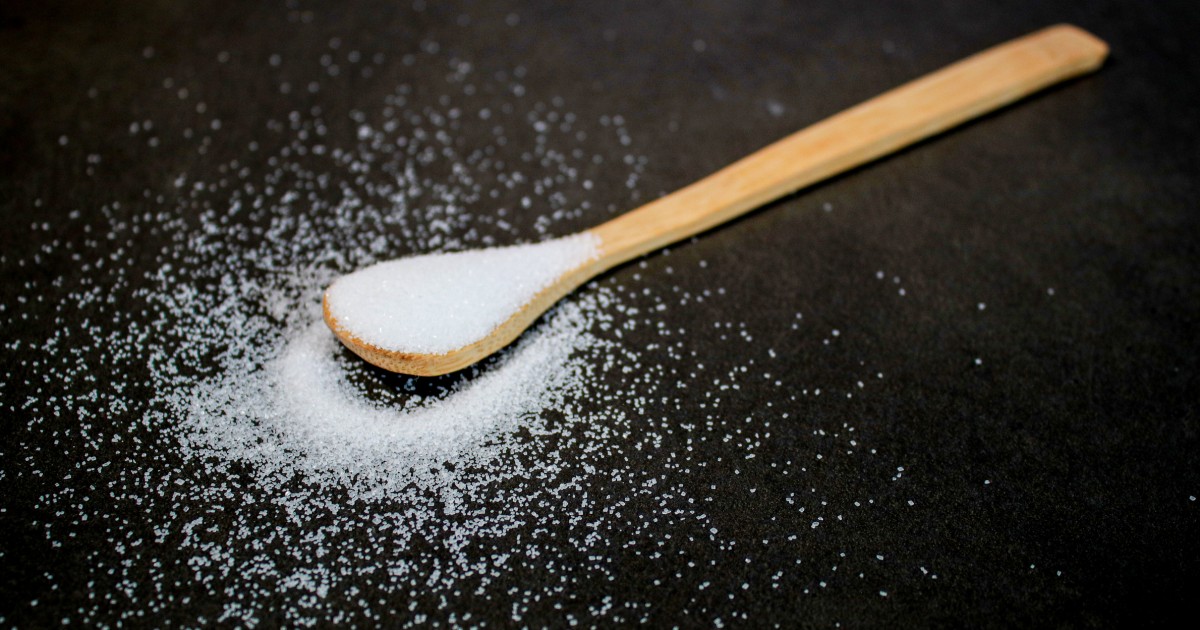
Another study is raising concern about the safety of the widely used sugar alcohol sweetener erythritol, a low-calorie sugar substitute found in “keto-friendly” foods, baked goods and candies. Researchers from the Cleveland Clinic compared erythritol to typical sugar and found only erythritol caused worrisome cardiovascular effects.
Although the study was small, it’s the first head-to-head look at people’s blood levels after they consume products with erythritol or sugar (glucose).
“We compared the results, and glucose caused none of the problems,” said Dr. Stanley Hazen, a cardiologist at the Cleveland Clinic and the lead author of the study, published Thursday morning in the journal Arteriosclerosis, Thrombosis, and Vascular Biology.
Erythritol is one ingredient on a growing list of nonsugar sweeteners found in low-calorie and sugar-free foods. Erythritol and xylitol are sugar alcohols that are sweet like sugar but with far fewer calories. Erythritol is often mixed with another sweetener, stevia, and xylitol is often found in gum, mouthwash and toothpaste.
Earlier studies from Hazen’s lab — one published last year and the other in June — found potential links between the sugar alcohols and an increased risk of heart attacks and strokes. The research suggested both sugar alcohols might make blood platelets stickier and therefore more susceptible to clotting and blocking veins or arteries, in turn contributing to heart attacks and strokes.
For the new research, Hazen’s team analyzed the heart effects of erythritol and regular sugar — in this case, simple glucose — by enrolling two groups of healthy middle-aged male and female volunteers: 10 who consumed the erythritol and 10 who consumed sugar.
Both groups fasted overnight. In the morning, their blood was drawn to measure platelet activity. Then, half the volunteers drank glasses of water with 30 grams of glucose mixed in, and half drank glasses of water with 30 grams of erythritol. Hazen said 30 grams of erythritol is an amount typical of erythritol-sweetened foods.
Related diet and nutrition news
Around 30 minutes after each group consumed the sweetened drinks, their blood was drawn and retested. Researchers found the people who consumed erythritol had increased platelet aggregation — meaning the blood was more likely to clot. Adults who drank the normal sugar drink had no changes in platelet aggregation.
The researchers measured a 1,000-fold increase in blood erythritol levels in the group given the erythritol drink. Those who drank glucose water didn’t have any changes in blood erythritol levels, and their blood glucose levels were only slightly increased. The finding stood out to Hazen, because it far exceeded the trace levels of erythritol that occur naturally in the blood.
“The amount in sugar substitutes is thousands of folds higher than what is made in our bodies, so to call it ‘natural,’ it’s not,” he said. “Your best recommendation is to avoid the sugar substitutes, and sugar alcohols in particular, because there’s an acute increase in the likelihood of clotting events once you ingest them.”
The Food and Drug Administration considers artificial sweeteners, including erythritol and xylitol, as GRAS, or generally recognized as safe. Hazen hopes mounting evidence about the sugar alcohols might trigger the FDA to look more closely at the data.
Outside the U.S., the concerns have drawn interest among food regulators. Last year, for instance, the European Food Safety Authority recommended that the European Commission request data about how much erythritol is in food, which could help clarify the risks.
Do the findings indicate that erythritol is worse overall than high-calorie sugar? Valisa Hedrick, a registered dietitian at Virginia Tech, said a diet high in sugary foods can lead to elevated blood glucose levels that are also linked to stroke and clotting risks. Hedrick wasn’t involved in the Cleveland Clinic study.
The study has several important limitations. Beyond the small number of participants, it measured the effects of erythritol and glucose at only one point in time, as opposed to over months or years of consistent consumption, Hedrick noted.
And the amount of glucose in the sugar water — about 30 grams — is the equivalent of about 120 calories of sugar. Sugary beverages, especially juices and sodas, often contain more sugar.
For example, a 12-ounce can of Coca-Cola contains 39 grams of sugar, and 12 ounces of Mountain Dew contains 46 grams.
Michael Goran, a professor of pediatrics at the University of Southern California’s Keck School of Medicine, said it might also be worth comparing erythritol to both fructose and glucose. The combination of fructose and glucose is more typical of sugary juices and sodas than glucose alone, he said. Goran wasn’t part of the new study.
Hazen’s study looked at glucose alone.
Although the Cleveland Clinic study didn’t find negative effects from consuming sugar, the researchers agreed the data doesn’t mean sugar is in the clear. Higher amounts of sugar may cause similar platelet effects, especially in people with diabetes, who can’t effectively regulate high blood glucose.
Hazen’s study focused specifically on healthy people, not people with diabetes.
It could also be important to analyze whether heart effects differ when people consume food with erythritol compared with water with erythritol, said Dr. Michelle Pearlman, a gastroenterologist who is CEO and a co-founder of the Prime Institute in Miami.
“Factors such as protein, fat, fiber and other nutrients might influence this response,” she said.
Ultimately, said Hedrick of Virginia Tech, the new study underscores the need for more research comparing the health effects of sweeteners versus sugar.
Hazen and his colleagues concluded the research by urging further studies focusing on erythritol’s heart risks, particularly in people already at higher risk of strokes and clotting.






